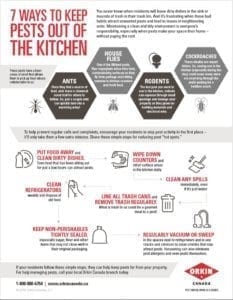Chances are, you’ve seen it before. A resident lets dirty dishes or smelly trash pile up for way too long, and suddenly, there’s a pest crisis on the premises.
But let’s be real. Residents don’t bear the costs for inviting pests in—you do. That means there are a lot of opportunities for you to be left on the hook for thousands of dollars in treatment and clean-up.
Pest prevention in multi-family residences is a shared responsibility. One compromised kitchen is all it takes for an introduction to become a full infestation. And what’s more, this transition can happen astonishingly quickly, with bugs or rats taking up residence and multiplying before you even know they’ve arrived.
That’s why it’s important to educate residents on how to prevent these unwanted visitors early and often, before you end up with a major problem. If left unchecked, you could have multiple units brimming with ants, house flies, rodents, cockroaches and other crawling critters—none of which are pleasant roommates.
Here are a few things you should ask of your residents to help avoid a pest takeover:
- Put food away and clean dirty dishes
- Wipe down counters
- Clean any spills
- Line all trash cans and remove trash regularly
- Clean refrigerators
- Keep non-perishables tightly sealed
- Regularly vacuum or sweep
Residents who follow these simple steps can help make your building a safer and healthier place to live for everyone. Plus, each of these actions only takes a few extra minutes during their day. It’s a small price to pay compared to dealing with a swarm of pesky intruders.
Want more details about how to keep your residents in the know? Download “7 Ways to Keep Pests Out of the Kitchen” to learn more kitchen-specific pest prevention in multi-family units.
You may also like
Canada's Top 25 Bed Bug Cities Of 2023
Bed bugs are extremely efficient hitch hikers. They can move easily across a room and climb onto luggage or anything left on a bed in just one night. Learn which cities have made Canada’s top 25 bed buggiest cities.
British Columbia's Top 20 'Rattiest' Cities 2023
As winter approaches, pest control leader Orkin Canada reminds homeowners and business owners to take precautions to help keep rodents out. Cities are ranked by the number of rodent (rat & mice) treatments the company performed from August 1, 2021 through July 31, 2022.
Ontario's Top 25 "Rattiest" Cities 2023
Pest control leader Orkin Canada reminds home owners and business owners to take precautions to help keep rodents out. Cities are ranked by the number of rodent (rat & mice) treatments the company performed from August 1, 2022 through July 31, 2023. This ranking includes both residential and commercial treatments.
Eastern Canada's Top 15 'Rattiest' Cities 2023
As winter approaches, pest control leader Orkin Canada reminds homeowners and business owners to take precautions to help keep rodents out. Cities are ranked by the number of rodent (rat & mice) treatments the company performed from August 1, 2021 through July 31, 2022.
Remove pests from your business, and stop them from coming back
We work hard to listen, understand and assess your unique situation. Request a free, no-obligation consultation today for a customized pest program that fits your needs.
Request a Free Business ConsultationRequest a Free Home Estimate


